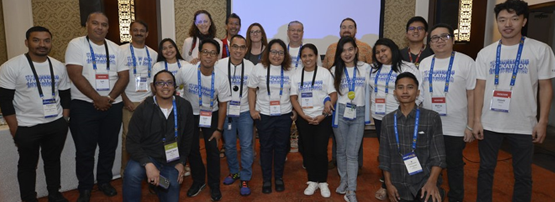
APRICOT 2023 / APNIC 55 was finally back in-person after two years, and so was the APNIC Hackathon.
The fourth Hackathon was more exciting than ever. It brought together 10 delegates from eight economies around the APNIC region, most of whom have a background in network operations. Along with five mentors and a number of facilitators, it was an intensive weekend of productivity and collaboration.
As with the previous three hackathons, the projects developed revolve around a central theme. The theme for this year was ‘IPv6 Diagnostics Framework‘. Delegates were tasked to develop a framework for IPv6 diagnostics to help organizations identify and resolve deployment-related IPv6 issues, as well as improve the performance and security of IPv6 networks.
With three teams formed, the participants spent most of the morning of day 1 brainstorming ideas along with their mentors. While there were many possible projects, the teams managed to narrow them down to more specific ideas on tools for path latency computation, route symmetry, and route visibility for IPv6.
After two days of arduous work, the session wrapped up with a final round of presentations. Many conference participants also joined to watch. Here is a rundown of the projects in detail:
Team 1: KAJEN — v4 vs v6 RTT to ccTLD
Team KAJEN comprised Epeli Tagi, Ninja Tadifa, and Joseph Arino, with guidance from Anurag Bhatia and Kabindra Shreshta, and mentors Jocelyn Bateman and Narelle Clark.
The goal of the project was to determine route symmetry between IPv4 and IPv6. To solve this, they used existing RIPE Atlas probes that are IPv4 and IPv6-capable, then analysed route latencies from these probes to ccTLD servers of a chosen economy. The team collated the measurement results (ping and traceroute) into an HTML table to compare.
View Team KAJEN’s slides:
Team 2: JRMP — Visualization based on delegation resources
Team JRMP comprised Minh Lay (Makito), Phyo Phyo Hein, Jervic Santos and Russell Harada, mentored by Amante Alvaran.
The team worked on a Route Visibility Tool, which can search routes by prefix or country code and perform a comparison of the delegated prefix with that of the routing table. The tool developed successfully outputs its status — if there is an exact match, a sub-prefix is found, or not at all.
View Team JRMP’s slides:
Team 3: EAGLE — RIPE Atlas for path latency computation
Team EAGLE comprised Dibya Khatiwada, Ulsbold Enkhtaivan, Erika Sobrino and Subhashini Kadurugasyaya, with mentor Philip Paeps and special guest mentor Geoff Huston.
The project aimed to identify the difference between IPv6 and IPv4 performance in terms of path links, latency, and DNS. The team managed to output round-trip time (RTT) data in graph format and compared it among different regions.
View Team Eagle’s slides:
Lessons learned
Coming from diverse backgrounds, the teams showed excellent teamwork, pooled their skills and brought their A-game to complete the tasks.
With all the high-quality projects presented, the jury deliberated for some time. All the projects were impressive given the time limitation but in the end, Team JRMP was awarded the best project.
Apart from the impressive project outcomes, the Hackathon also highlighted the importance of mentoring and teamwork. Each team had one or two mentors with them to brainstorm ideas for the project. The mentors served as guides to the participants in navigating the problem, finding potential solutions, and narrowing down ideas to something useful and achievable within a limited time.
The Hackathon also highlighted the varied sources of raw data that can be used, including the APNIC API, APNIC delegation data, RIPE Atlas probes, and so forth. Collating the information from various sources and putting it together in a meaningful way can produce tools that are useful to the Internet community.
The views expressed by the authors of this blog are their own and do not necessarily reflect the views of APNIC. Please note a Code of Conduct applies to this blog.
